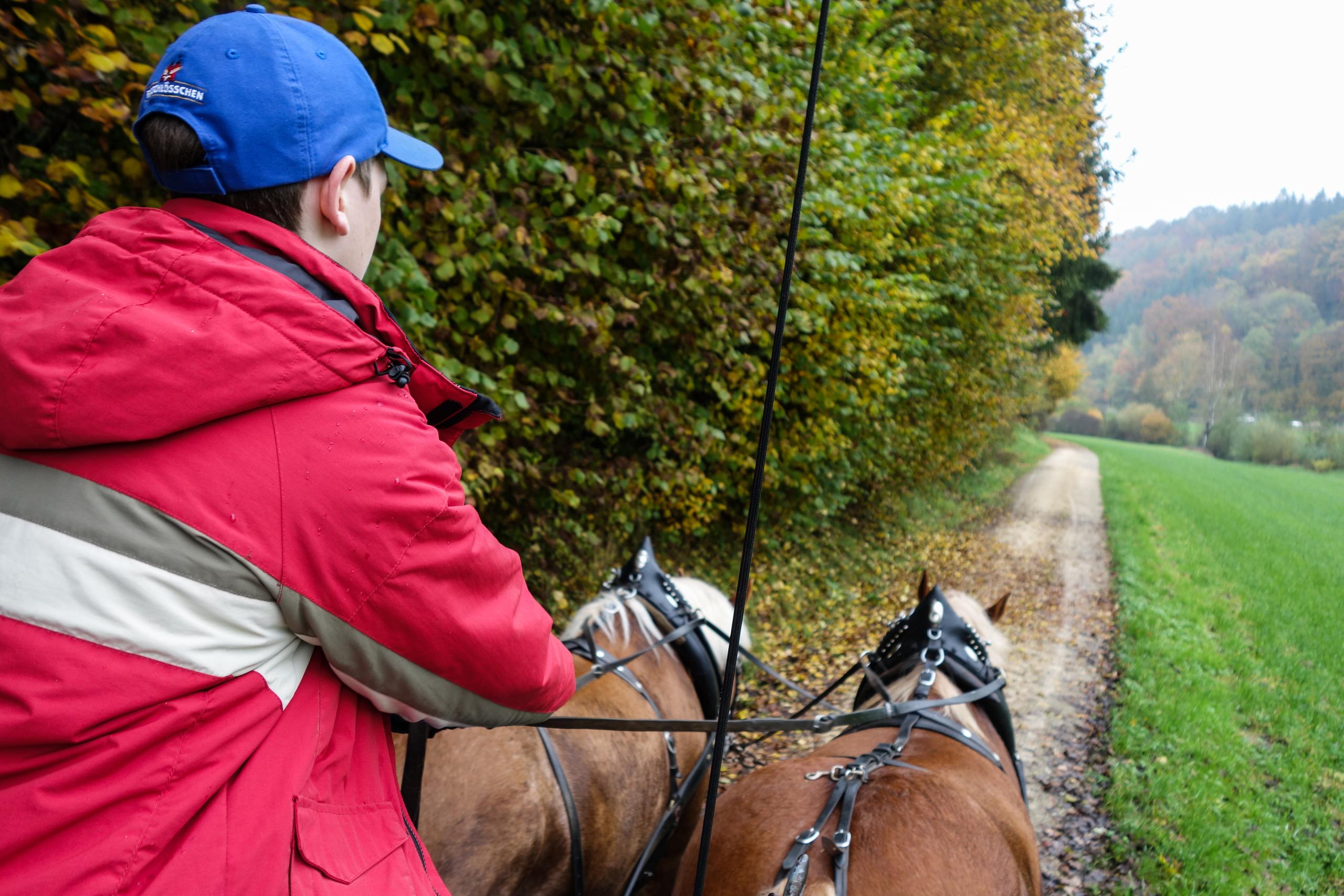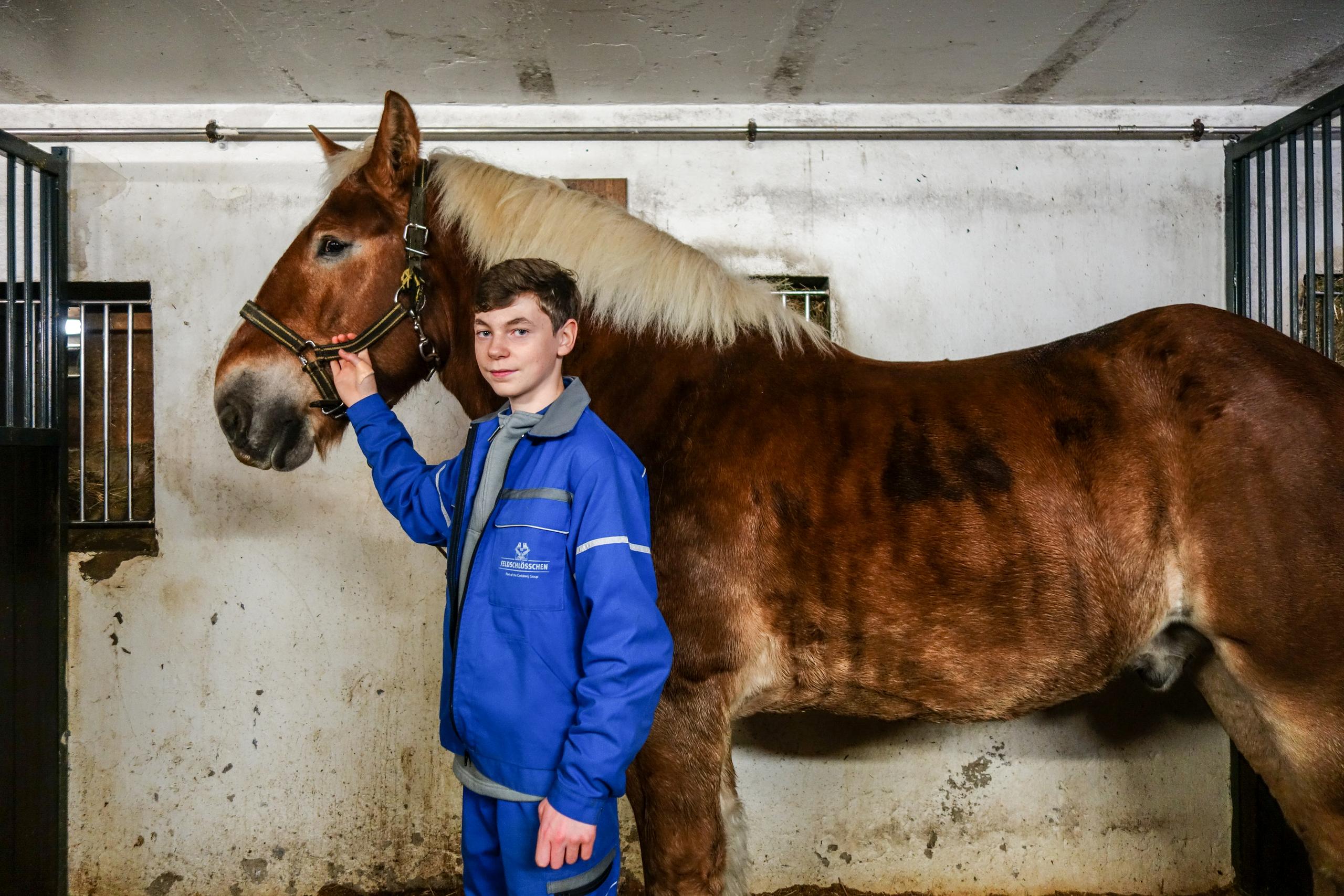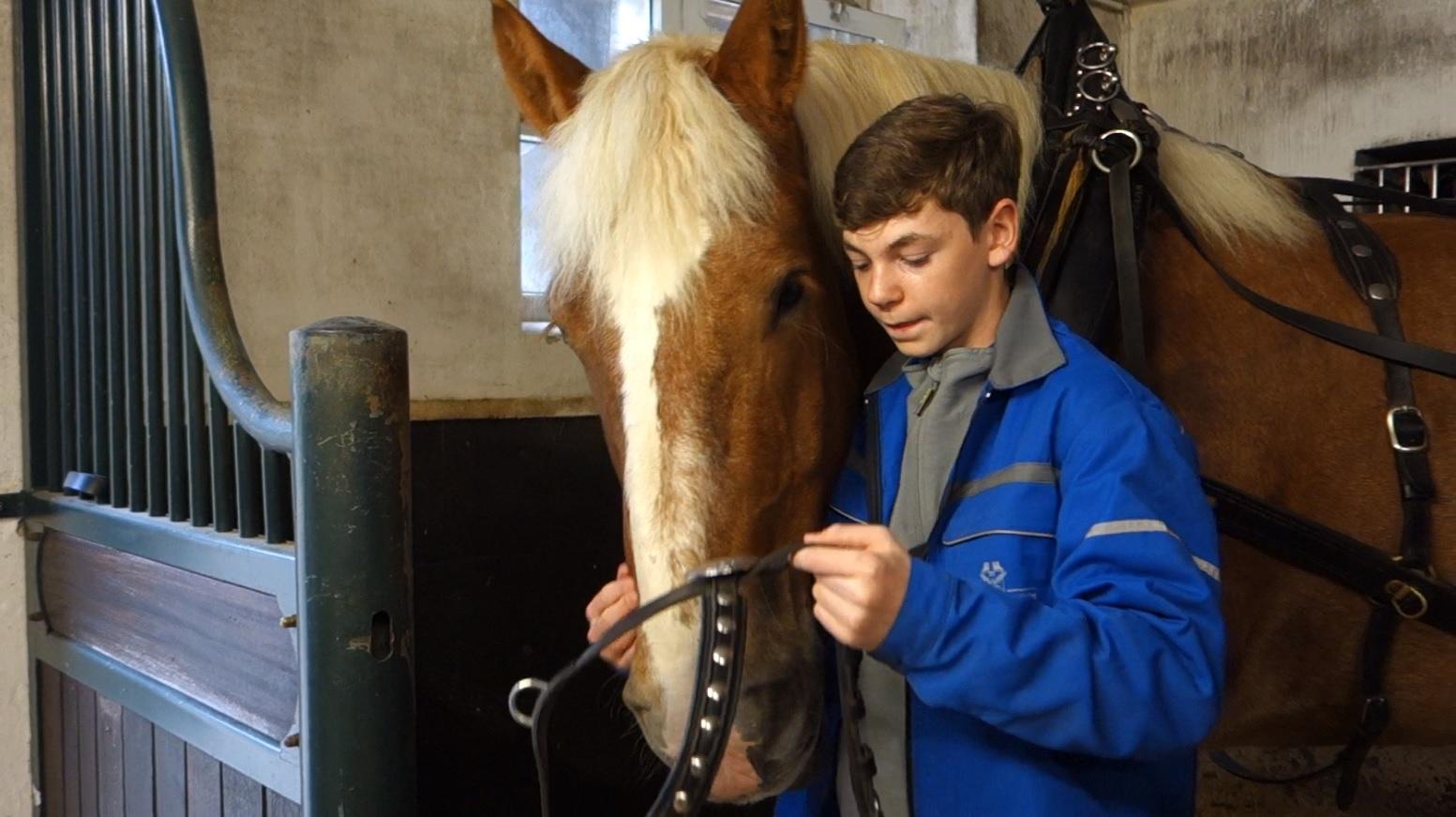
Swiss teen works with brewery horses

Too young to drive a car, and barely old enough to order a beer, a Swiss teen has an unusual job at a brewery near Basel. David Gilligan is learning to drive a wagon powered by Belgian draught horses. It’s a one-of-a-kind apprenticeship in Switzerland, and a first for the brewery itself.
When looking into career options, 16-year-old David knew he wanted to work with animals. First he did a summer job at the zoo in Basel. Later on, he had the chance to help out at the FeldschlösschenExternal link stable for a week – to see if it might be something for him.
“I liked it, and now I’m here, and I’m happy,” says David, dwarfed by the eight enormous horses that live in a barn beside the yellow brick castle where 40 types of beer are brewed in Rheinfelden.

More
The horses and their boy
Each animal weighs about 900 kg (2,000 pounds) – twice the weight of an average horse, and probably 15 times heavier than David. Yet the brown Belgians with the blond manes seem to respect the growing authority of the dark-haired boy with the gentle voice.
“Inside the stable, we’re the boss,” laughs David when I ask who’s in charge. “But outside, it’s Hektor – the oldest horse.”
A bit shy, David appears more at ease with the giant beasts than he does with a nosy member of his own species, like me. But he’s got a friendly twinkle in his blue eyes as he talks about the horses – who have names like Geronimo, Lord, and AramisExternal link.
Swiss apprenticeships
Thanks to the apprenticeship system, young people in Switzerland can get hands-on work experience from an early age. When they finish their compulsory schooling at age 14 or 15, they choose between senior high school or an apprenticeship – which typically lasts three years and combines classroom lessons with practical experience. David started his apprenticeship in August 2016. The official job title is “equine professional, with expertise in driving a harnessed team”.
Horses and carriage
David’s days at the stable start at 6:30 in the morning, when he and his colleagues feed the horses and muck out the stalls. But a key part of David’s training is learning to drive a brewery dray. In keeping with tradition at the Feldschlösschen brewery, a two-horse team delivers beer in Rheinfelden’s old town every week. For festivals and other special events, the brewery has an impressive six-horse carriage.
David’s deft fingers are efficient as he fastens the metres of leather straps that keep the horses securely connected to the wagon. For now he’s learning to drive the two-horse dray; eventually, he’ll graduate to four- and six-horse versions.
As soon as draught horses Nero and Roli are ready to go, we head out to a forest road under the direction of Hubert Schlachter, a more experienced colleague in the team. The two men occupy the driver’s seat. This being a practice drive, there’s no frothy cargo.
Hubert explains what David needs to concentrate on the most. “The way he holds his hands – to get a feel for the horses, and to be able to steer them. And that’s the hard thing – getting that feeling in your fingers.”

More
Taking the reins
I ask David how he feels the lessons are going. “Now I feel good with the two horses in front of me that I can drive. It’s a good feeling,” he says. Then the road dips downhill, and David needs to concentrate on braking. Luckily, the horses don’t seem too eager to run off, and we can admire the quiet beauty of the forest.
“We take the horses out for an hour or two a day; they need the exercise to stay fit,” points out David, adding that the same is true for him. He admits that sometimes, his arms get tired – especially depending on how hard to horses are pulling. On the way back to the stable, he has to turn the reins over to Hubert. His hands are sore, and he knows he shouldn’t risk a tendon infection in the damp and chilly weather.
Horse whisperer
Back at the stable, the horses have quite a thirst. Nero takes a long drink at the water cooler in his stall.
“He was very thirsty because he had to work for so long. The horses have to eat and drink just like we do,” points out David. Just months into his apprenticeship, David already knows a lot about the horses, their needs and behaviour. Roli nuzzles him affectionately as we’re chatting. David jokes that the gentle giant likes him when he gets fed, but not so much if he’s being told “No”. He says the horses also don’t like it if you pull on or fuss with them too much.
“They all have different characters, and you need to act differently with each one,” David notes. But he hasn’t got a favourite – at least not yet.
On the days he’s not working with the horses, David attends school to study topics that will round out his education. The apprenticeship will take three years to complete – and then he’ll be a bona-fide equine professional, specialised in driving a harnessed team. The plan is for him to stay at the brewery, but he could also work at an equestrian centre or on a farm. In 2015, there were 346 young people doing horse-related apprenticeships – accounting for about 9% of apprentices in the agriculture industry according to the Swiss Farmers’ UnionExternal link.
For David, the best part of the job is simply being with the horses. “Of course I’m always with them here, but it’s so fun!”
Other unusual apprenticeships
In theory, it’s possible to learn just about any job as long as there’s an individual professional or a company willing to take on a trainee. Did you know that in Switzerland, there’s formal training available for milliners, bricklayers, confectioners and instrument makers?

In compliance with the JTI standards
More: SWI swissinfo.ch certified by the Journalism Trust Initiative


























You can find an overview of ongoing debates with our journalists here . Please join us!
If you want to start a conversation about a topic raised in this article or want to report factual errors, email us at english@swissinfo.ch.